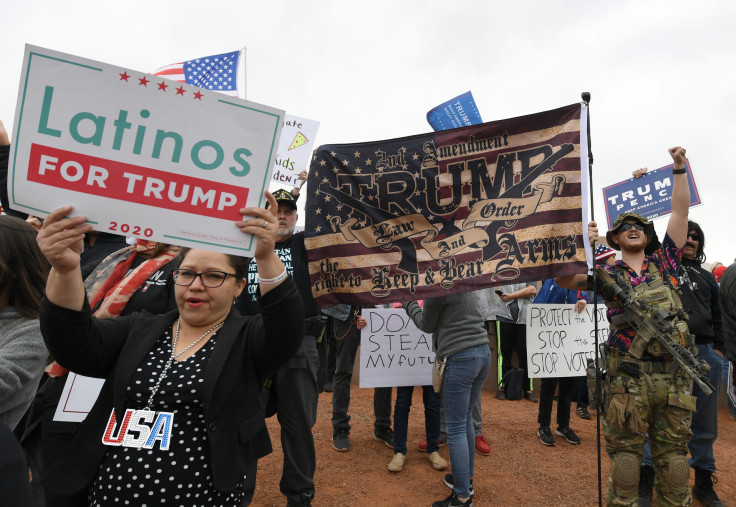
President Donald Trump's standing among Latino voters has entered dangerous territory, and the warning signs are being led by Latina women. A new poll from Somos Votantes, Somos PAC, and Global Strategy Group shows that Latinas have turned sharply against him, and the shift is reverberating across gender and generational lines. The decline comes as Trump doubles down on immigration and border rhetoric, even as Latino families say their top concern is the economy.
According to the data, published by Politico, Trump's approval ratings have collapsed among Latias.
The third-quarter survey shows his net job approval with women plummeting to –36, compared with –6 in February. Economic approval among women is even worse, now at –45. Latina women were already skeptical of Trump in earlier polling, but the latest numbers show their disapproval is widening to historic levels.
Women often anchor household decisions on budgeting and caregiving. As food prices rise, rent climbs, and healthcare costs remain high, Latina women are reporting greater levels of economic anxiety than their male counterparts. According to the poll, more than one in four Latino voters overall say they are struggling to meet expenses, but among women the concern is more acute: six in ten list food prices as a top worry, and nearly half say they are "very concerned" about affording basic necessities.
Men and Youth Follow Their Lead
The erosion is not limited to women. Latino men, once thought to be more pragmatic toward Trump, have also flipped. Earlier this year, some analysts suggested men were adopting a "wait and see" posture, but the September numbers erase that theory. Trump's economic approval among Latino men is now –40, with majorities blaming his tariff policies for pushing up the cost of everyday goods.
Young Latinos, ages 18 to 29, are another group abandoning Trump. Their net economic approval has tumbled to –37, reflecting both immediate financial strain and generational frustration over the rising cost of living. Unlike in past cycles, where younger Latinos could be ambivalent, this data suggests clear rejection.
Immigration vs. Economy: A Disconnect
One of the most striking findings is the disconnect between what Trump emphasizes and what Latino voters want addressed. Nearly half of those surveyed (47 percent) believe Trump is most focused on immigration and the U.S.-Mexico border. But when asked about their own priorities, Latinos overwhelmingly cite inflation and the cost of living (50 percent) and jobs and the economy (39 percent).
Only 15 percent believe Trump is focused on jobs, and just 17 percent think he is prioritizing inflation.
That gap may explain why his numbers are tumbling so quickly. While Trump continues to center immigration in his campaign speeches, Latino voters see that as tone-deaf when their grocery bills and rent are consuming more of their paychecks. Immigration remains a high-profile issue, but in 2025, it is not what is driving Latino political behavior.
Tariffs and Everyday Costs
Tariffs, a signature Trump policy, are a clear flashpoint. Seventy-one percent of Latino voters say tariffs are raising the cost of the things they buy, with 42 percent saying prices are going up "a lot." Food costs top the list of concerns: 60 percent of respondents are "very concerned" about grocery prices, while others point to projected job losses and rising family expenses.
The economic frustration extends beyond tariffs. Trump's H.R. 1 tax bill remains deeply unpopular, with 74 percent of Latinos opposing it and 62 percent strongly opposed. Cuts to Medicaid and food assistance programs rank among the most alarming provisions for this community. For Latina mothers in particular, Medicaid cuts are viewed as a direct threat to family wellbeing.
Broader National Trends
Nationally, Trump's economic numbers are sagging as well. A Reuters/Ipsos poll this month placed his overall job approval at 42 percent, with just 36 percent of Americans approving of his economic management. Among Latinos, the new Somos poll suggests the decline is steeper and accelerating.
The stakes are high. Latinos are the fastest-growing share of the electorate, and their turnout has been decisive in battleground states from Arizona to Nevada. Trump made inroads with some Latino men in 2020 and 2024, but if the current slide continues, those gains could evaporate.
Strategists warn that the latest numbers are not just a temporary dip. "The idea that Latino men were going to give Trump time is gone," said one Democratic analyst reviewing the data. "What we're seeing is erosion that cuts across gender and age — and Latina women are leading the shift."
The message from voters is clear: pocketbook issues come first. Latinos want leaders to tackle inflation, lower costs, and strengthen job opportunities. Trump, however, continues to emphasize immigration and border policy, which, while central to his political identity, is increasingly out of step with the daily concerns of Latino families.
© 2025 Latin Times. All rights reserved. Do not reproduce without permission.







